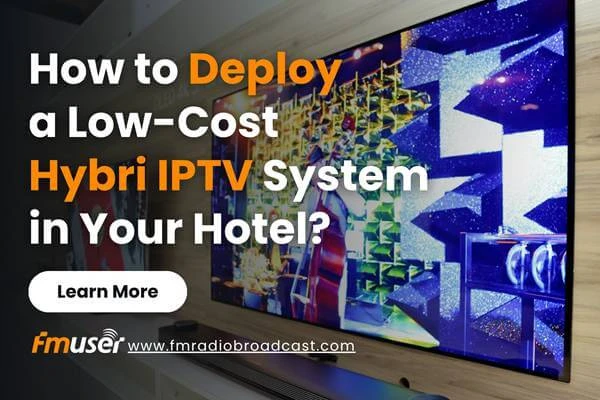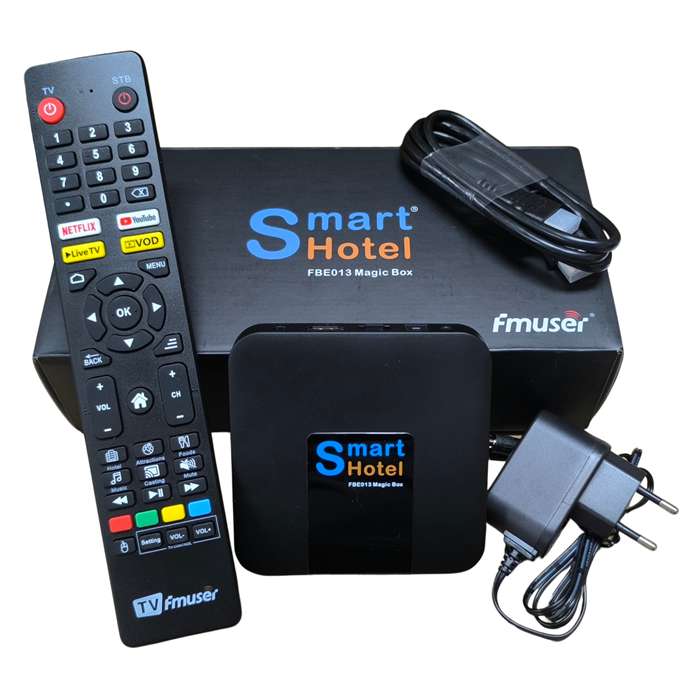
Hot tag
Popular search
How to Deploy a Low-Cost Hybrid Hotel IPTV System Without Overhauling Cable TV

Why Hybrid IPTV? Bridging Old & New Without Emptying Your Budget
Why rip out functional systems when you can enhance them? A hybrid IPTV solution lets you modernize guest entertainment without gutting your existing infrastructure.
1. The Problem: Total Overhauls Are Expensive (And Often Unnecessary)
For years, hotels relied on traditional cable TV systems. But outdated technology can’t keep up with guest demands for features like video-on-demand, multilingual content, or personalized services. The knee-jerk reaction? Rip and replace: tear out coaxial wiring, discard headend devices, and start fresh with a brand-new IPTV setup. Unfortunately, this approach drains budgets—especially for mid-sized hotels or those renovating incrementally.
Think about it:
- Removing miles of functional coaxial cabling costs time and labor.
- Replacing aging but operational headend equipment feels wasteful.
- Full IPTV installations often require costly rewiring or fiber upgrades.
The result? Many hotels delay upgrades, leaving guests stuck with subpar entertainment.
👇👇 New Arrival! 👇👇
FMUSER FBE013 Magic IPTV STB Kit with RC
|
FMUSER FBE013 IPTV Smart Hotel Magic Box Kit with RC! Click here for details.
|
 |
2. The Smart Solution: Hybrid IPTV = Modern Features + Legacy Infrastructure
Hybrid IPTV isn’t a compromise—it’s a budget-conscious evolution. Instead of abandoning your cable TV backbone, this approach enhances it by integrating IPTV features directly into your existing setup.
How it works:
- Retain coaxial wiring: Use the same cables that already run through your walls to deliver both traditional cable channels and IPTV signals.
- Repurpose headend equipment: Convert analog signals to digital with affordable encoders, avoiding costly replacements.
- Add IPTV features incrementally: Start with basics like video-on-demand (via cost-effective middleware), then scale up to interactive services.
Example: A 150-room hotel reused its coaxial infrastructure and saved 60% upfront versus a full IPTV overhaul.
3. Why This Matters for Budget-Conscious Hoteliers
- Cut upfront costs: Skip rewiring and keep functional cable assets.
- Zero guest disruption: Upgrade behind the scenes without closing rooms.
- Future-proof flexibility: Transition to full IPTV later, at your own pace.
“Hybrid systems let hotels innovate without betting the farm. It’s the fiscally responsible way to stay competitive.”
4. FMUSER’s LAN-Based Hybrid Model: Control Costs, Not Quality
While cloud-based IPTV offers scalability, LAN-based hybrid solutions (like FMUSER’s) are ideal for hotels prioritizing:
- One-time investments: Avoid monthly subscription fees.
- Offline reliability: No buffering from internet outages.
- Full ownership: Manage content and updates internally.
Did You Know? FMUSER’s hybrid middleware integrates seamlessly with most cable systems, letting you add IPTV features without replacing set-top boxes in every room. Curious how much you could save with a hybrid approach? Compare cost scenarios for your hotel or talk to our team to explore options.
Contact Now, We're Here to Help!
Step 1: Audit Your Cable TV Assets (What You Already Own Matters)
Before spending a dime on new infrastructure, look closer—your existing cable system might hold the key to a low-cost IPTV upgrade.
1. Why Auditing Matters: Unlock Hidden Savings
Many hotels are sitting on untapped value: their legacy cable TV systems. By auditing what you already own, you can identify reusable equipment and minimize upfront costs. Think of it as a financial scavenger hunt—every salvaged component reduces your upgrade budget.
2. How to Audit: A Simple 3-Step Guide
1) Inventory Existing Equipment
Start by cataloging every piece of your current setup. Focus on:
- Coaxial cabling: Most hotels reuse existing wiring to transmit IPTV signals (saving thousands in rewiring costs).
- Headend devices: Amplifiers, modulators, or RF combiners.
- Set-top boxes: Check if they support digital signals or need upgrades.
- Distributors/splitters: Often reusable for hybrid setups.
Pro Tip: Work with your maintenance team—they know the system best.
2) Identify Reusable vs. Outdated Components
| Reusable | Outdated |
|---|---|
|
|
3) Map Your Hybrid Potential
- Ask: Can my coaxial network handle both cable and IPTV signals? (Most can!).
- Ask: Which rooms need new hardware, and which can reuse existing gear?
3. FMUSER’s Role: Bridging the Old and New Seamlessly
FMUSER’s hybrid middleware acts like a translator between your legacy cable system and modern IPTV features:
- No rip-and-replace: Integrates with analog and digital headend equipment.
- Cost-effective upgrades: Use existing coaxial lines to deliver IPTV to guest rooms.
- Future-ready: Gradually replace outdated components over time.
“Our middleware lets hotels modernize one floor at a time. You don’t need to overhaul everything overnight.”
4. Avoid These Common Audit Mistakes
- Skipping signal testing: Check if cables support digital bandwidth (most post-1990s installations do).
- Overlooking partnerships: Work with vendors like FMUSER who specialize in hybrid solutions—they’ll help interpret audit results.
- Rushing the process: A thorough audit takes time but pays off in long-term savings.
Need a second opinion on your audit? Download our free Cable-to-IPTV Asset Checklist or chat with our hybrid experts to avoid costly oversights.
Contact Now, We're Here to Help!
Step 2: Choose Your Model—Cloud vs. LAN: Which Saves More Long-Term?
Cloud or LAN? Your choice here could save your hotel thousands over the next decade. Let’s break down which model aligns with your budget and goals.
1. The Two Paths to Hybrid IPTV: Key Differences at a Glance
Not all hybrid systems are created equal. The choice between Cloud-based and LAN-based models impacts upfront costs, ongoing expenses, and control. Here’s what hoteliers need to know:
1) Cloud-Based Hybrid IPTV
Relies on internet-connected servers managed by a third party.
| Pros | Cons |
|---|---|
|
|
2) LAN-Based Hybrid IPTV (FMUSER’s Focus)
Hosted on your hotel’s local network using on-site servers.
| Pros | Cons |
|---|---|
|
|
2. Tactical Advice: How to Decide? Ask These 4 Questions
Use this checklist to find your fit:
- “Do I prioritize upfront savings or long-term value?”: Cloud = lower startup costs, LAN = higher initial investment but lower TCO (Total Cost of Ownership).
- “Is my internet connection reliable?”: Rural hotels or those with spotty Wi-Fi should lean toward LAN.
- “Do I want full control over content and updates?”: LAN lets you tailor the system (e.g., adding local channels).
- “Am I expanding soon?”: Cloud scales faster, but LAN is cheaper for steady, predictable growth.
3. Why FMUSER’s LAN Model Wins for Budget-Conscious Hotels
FMUSER’s LAN-based hybrid hotel IPTV solution is built for hotels that:
- Hate surprises: Avoid unpredictable monthly fees.
- Reuse existing hardware: Integrates with your current cable infrastructure (saving $$ on coaxial rewiring).
- Value simplicity: Pre-configured servers and plug-and-play encoders reduce setup complexity.
“With a LAN system, what you see is what you get—no hidden costs years down the road.”
4. Real-World Scenario: Cloud vs. LAN Over 5 Years
| Model | Upfront Cost | 5-Year Cost (300-Room Hotel) |
|---|---|---|
| Cloud | $5,000 | $5,000 + ($3/room × 300 × 60 months) = $59,000 |
| LAN | $30,000 | $30,000 (no subscriptions) |
| Savings with LAN: $29,000 after 5 years. |
||
Still unsure? Use our Cloud vs. LAN Cost Calculator to project savings for your property, or talk to our team for unbiased advice.
Contact Now, We're Here to Help!
Step 3: Phased Rollout—Modernize Gradually, Disrupt Minimally
Upgrade smarter, not all at once. A phased hybrid IPTV rollout lets you balance innovation with daily operations—no full shutdowns, no massive debt.
1. Why Phased Rollouts Win for Budget-Focused Hotels
A full-scale IPTV overhaul can strain budgets and frustrate guests with room closures or service disruptions. A phased approach solves this by modernizing your hotel incrementally, allowing you to:
- Preserve cash flow: Spread costs over months or years.
- Test and adjust: Refine the system in smaller batches.
- Minimize guest impact: Keep existing TV services running in older sections.
Real-World Example: A 200-room luxury hotel upgraded 50 rooms/year to hybrid IPTV, cutting upfront costs by 40% while maintaining 100% occupancy during renovations.
2. 3-Step Strategy for Smooth Phased Deployment
1) Start with New Wings or Renovated Areas
- Priority: Target zones where walls are already open (e.g., new construction, renovated floors).
- Benefits: Avoid rewiring costs by installing IPTV-ready coaxial cables. Use FMUSER’s hybrid encoders to blend new IPTV signals with existing cable infrastructure.
- Quick Win: Deploy IPTV in high-value suites first to justify costs with premium guest experiences.
2) Use Affordable Encoders to Bridge Old and New
- How it works: Encoders (like FMUSER’s H.265 models) convert analog cable signals to digital IPTV streams. This lets older TVs and coaxial lines support modern features.
- Cost Saver: A single encoder can handle 8–16 rooms, reducing hardware needs by 80% vs. traditional setups.
- Installation Tip: Mount encoders in existing cable hubs (e.g., headend rooms) to avoid cluttering guest areas.
3) Maintain Cable in Older Sections (For Now)
- Hybrid Harmony: New IPTV rooms and legacy cable rooms can coexist on the same network.
- Guest Communication: Use on-screen notifications or lobby signage to manage expectations (e.g., “New interactive TV services rolling out soon!”).
3. FMUSER’s Hybrid Encoders: The Backbone of Phased Upgrades
FMUSER’s encoders are designed for hotels that need flexibility without complexity:
- Seamless Integration: Converts existing cable TV signals to IPTV-compatible formats instantly.
- Gradual Scaling: Add encoders room-by-room as budgets allow.
- Zero Guest Downtime: Encoders work behind the scenes—no service interruptions during installation.
4. Phased Rollout Pitfalls to Avoid
- Underestimating bandwidth: Ensure coaxial lines support HD streaming (FMUSER’s team can test this pre-installation).
- Siloed teams: Align your maintenance, IT, and front desk staff to coordinate upgrades.
- Ignoring future-proofing: Choose encoders that support 4K/HDR for upcoming guest expectations.
Ready to plan your phased rollout? Download our Phased Upgrade Toolkit for a step-by-step timeline, or schedule a free infrastructure assessment with our engineers.
Contact Now, We're Here to Help!
Step 4: Activate Modern Features Without Replacing Everything
Your guests want modern entertainment, but your budget doesn’t need a blank check. Here’s how to unlock video-on-demand and interactive services—without swapping every TV or cable box.
1. The Opportunity: Enhance Guest Experience, Not Hardware
Legacy cable systems aren’t dead ends. With smart upgrades, you can layer IPTV features onto existing infrastructure, turning dated setups into tech-savvy hubs that impress guests and keep budgets intact.
2. Cost-Saving Upgrade 1: Add Video-on-Demand (VoD) with Low-Cost Middleware
1) What is Middleware?
Think of it as the “brain” that manages your IPTV system. Budget-friendly middleware lets you:
- Curate VoD libraries: Offer movies, shows, or destination guides.
- Monetize content: Charge guests for premium films or package deals.
- Update remotely: No need to manually tweak every set-top box.
2) How to Do It:
- Choose middleware compatible with both IPTV and cable signals (e.g., FMUSER’s hybrid-ready software).
- Upload content to a local server or cloud storage.
- Use existing coaxial lines to deliver VoD to guest TVs via IP set-top boxes.
Example: A ski resort added a VoD library for $1,200 using middleware and reused 90% of its cable hardware—guests now pay $12/movie, generating $3K/month in revenue.
3. Cost-Saving Upgrade 2: Interactive Menus on Existing TVs
Even older TVs can become smart guest portals with IP set-top boxes. Here’s how:
- Connect boxes to TVs via HDMI (no TV replacement needed).
- Customize menus with: Room service orders, Local attraction bookings, Multilingual content options.
- Sync with hotel systems: Let guests check bills, request housekeeping, or stream personal apps (Netflix, YouTube).
Bonus: Opt for touchscreen remotes to modernize interaction without replacing TVs.
4. Key Savings: Reuse, Don’t Replace
- Existing TVs stay: Use HDMI-compatible IP boxes (cost: $30–$80/unit) versus $300+/smart TV.
- Coaxial lines deliver data: No rewiring for internet-based services.
- Scalable middleware: Start with basic features, add modules later (e.g., hotel promo channels).
“Hybrid IPTV lets you cherry-pick upgrades. Focus on what guests notice—content and convenience—not hardware.”
5. FMUSER’s Hybrid Middleware: Your Budget’s Best Friend
FMUSER’s solutions are built for hotels that need big impact, small spend:
- Pre-integrated VoD tools: Drag-and-drop content libraries.
- Touchscreen menu templates: Ready-to-use designs for dining, spa, or local guides.
- No licensing fees: One-time purchase, no annual subscriptions.
Case Study: A 120-room B&B in Greece added interactive menus and VoD for under $3,500 using FMUSER’s middleware—earning a 4.8-star rating for “tech-savvy hospitality.”
6. Avoid These Upgrade Mistakes
- Overpaying for features: Choose modular middleware—only pay for what you need.
- Ignoring bandwidth: Test coaxial lines for HD streaming (FMUSER’s team offers free line audits).
- Overcompliance: Start with 1–2 features, expand as guests adopt them.
Want to see these upgrades in action? Request a demo of FMUSER’s middleware or download our VoD ROI guide to calculate your earnings potential.
Contact Now, We're Here to Help!
Future-Proofing: Scalability for Growing Hotels
A hybrid IPTV system should grow with your hotel—not trap you in a costly rebuild. Here’s how to ensure your investment scales as smoothly as your ambitions.
1. Why Scalability Matters for Mid-Sized Hotels
Hotels aren’t static: guest numbers fluctuate, new wings open, and tech demands evolve. A truly scalable hybrid IPTV system lets you adapt without overhauling infrastructure every few years.
The Hybrid Advantage:
- Start Small: Pilot IPTV in 50 rooms to test performance and guest feedback.
- Grow Smart: Add rooms, channels, or features incrementally—no need to “go big” upfront.
- Budget-Friendly Scaling: Pay for upgrades only when you need them.
Example: A coastal resort added 20 rooms annually over 5 years, upgrading its hybrid IPTV alongside expansions. Total cost? 35% less than a single massive installation.
2. FMUSER’s Modular Solutions: Build Your System Like LEGO®
FMUSER’s hybrid IPTV is designed for effortless scaling thanks to modular components:
- Expandable Servers: Start with a base server for 50 rooms; add capacity via plug-in modules for 100+ rooms.
- Plug-and-Play Encoders: Add more channels (e.g., international news, sports packages) with affordable encoder upgrades.
- Flexible Software Licenses: Unlock features like multi-language support or advanced analytics as demand grows.
3. 3-Step Scalability Strategy for Growing Properties
Step#1 - Start with a Pilot (50–100 Rooms)
- Test core features: VoD, live TV, and basic interactivity.
- Gather data: Track guest engagement (e.g., VoD usage, menu clicks) to justify expansions.
Step#2 - Upgrade in Phases, Aligned with Renovations or Expansions
- New wings? Deploy IPTV there first.
- Renovating floors? Swap analog set-top boxes for IP models.
Step#3 - Future-Proof with “Room to Grow” Hardware
- Select servers and encoders that support 4K streaming (even if you don’t need it yet).
- Ensure coaxial infrastructure can handle higher bandwidths (e.g., 750 MHz+).
4. Avoid Scalability Traps: Lessons from the Field
- Don’t lock into proprietary systems: Choose open-architecture solutions (like FMUSER’s) that let you mix vendors.
- Beware of “all-in-one” packages: They often include unused features. Opt for customizable modules instead.
- Plan for obsolescence: Ensure new components work with legacy gear (e.g., 10-year-old coaxial cables).
5. Scalability Checklist for Hoteliers
Ask your vendor:
- ✅ Can I start with a 50-room setup?
- ✅ Are upgrades truly modular (pay-as-you-grow)?
- ✅ Does the system integrate with my PMS and other hotel tech?
- ✅ Is technical support included for future expansions?
Contact Now, We're Here to Help!
Conclusion: Your Hotel Doesn’t Need a Revolution—Just a Smart Evolution
Hybrid IPTV isn’t a compromise—it’s a bridge to the future. By blending old infrastructure with new technology, you deliver modern guest experiences without the financial shock of a total overhaul.
1. Recap: The Hybrid Path to Smarter Hospitality
- Reuse Existing Assets: Coaxial cables, headend devices, and even analog TVs can evolve into modern IPTV tools with the right encoders and middleware.
- Control Costs: LAN-based systems (like FMUSER’s) slash long-term expenses, while phased rollouts let you budget upgrades on your timeline.
- Stay Scalable: Modular solutions ensure your system grows as you do—adding rooms, features, or bandwidth without reinventing the wheel.
- Remember: Full IPTV can wait. Hybrid lets you innovate incrementally, preserving cash flow while future-proofing your investment.
2. Why Hybrid Wins for Mid-Sized and Renovating Hotels
- Fiscal Prudence: Save 30–60% versus full IPTV overhauls by reusing cable infrastructure.
- Zero Guest Disruption: Upgrade behind the scenes—no room closures or service downtime.
- Future Flexibility: Transition fully to IPTV later, or stick with hybrid indefinitely. The choice stays yours.
Hybrid isn’t about cutting corners. It’s about spending smartly where it matters most: guest satisfaction and ROI.
3. FMUSER: Your Partner in Budget-Conscious Innovation
FMUSER’s LAN-based hybrid hotel IPTV solution is engineered for hotels that refuse to choose between quality and thrift:
- Legacy-Friendly: Works with coaxial systems from the 1990s to today.
- Ownership Model: No subscriptions, no surprise fees—just a one-time investment.
- 24/7 Support: From initial audits to future expansions, we’re here to keep your system running smoothly.
“We’ve helped 350+ properties transition to hybrid IPTV. Let us help you next.”
Upgrade smarter, not harder. Download our Hybrid IPTV Cost Calculator to see your potential savings, or schedule a free consultation with our experts to start your transition today. Don’t let outdated tech hold your hotel—or your guests—back.
Contact Now, We're Here to Help!
Tags
Contents
Related Articles
CONTACT US


FMUSER INTERNATIONAL GROUP LIMITED.
We are always providing our customers with reliable products and considerate services.
If you would like to keep touch with us directly, please go to contact us




